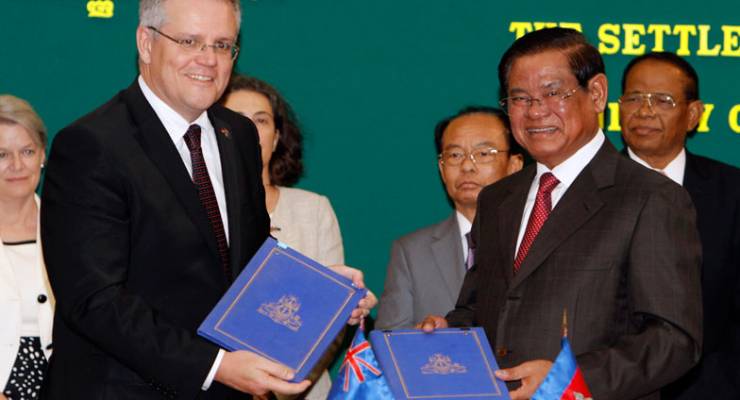
Then-Immigration Minister Scott Morrison poses with the signed deal alongside Cambodian Interior Minister Sar Kheng
Since Australia handed over $40 million to the kleptocratic government of Cambodia’s Prime Minister-cum-dictator Hun Sen to resettle refugees from the offshore detention facility in Nauru in 2014, the political situation in the country had continued to deteriorate.
The country’s opposition leader in back in self-imposed exile with an arrest warrant hanging over his head, his deputy faces the same fate but is refusing to turn himself in to police, about a dozen opposition MPs and leading government critics have been tossed into jail and, on July 10, a leading independent critic of the government was murdered in broad daylight.
A hell of a place to send people desperate enough to commit their lives to people smugglers to escape repression in their own countries.
It’s now known that the resettlement scheme has been an abject, embarrassing failure. Of the four — count them, four — refugees who chose to shift to one of Asia’s poorest and most repressed countries (half of Cambodia’s annual budget remains foreign aid), only one remains. No more are likely to come, nor should the government be encouraging them to.
But the sheer amorality of the Coalition government in doing a deal with Hun Sen, knowing full well that most of the money, like so much aid money send to Cambodia, would end up in private coffers, remains bewildering.
The deal was worth more than the straight $40 million. Australia ponied up for all the costs of the refugees and, importantly, Cambodia did not have its aid budget cut like all its south-east Asian neighbours.
To giver the men and woman of DFAT their due, there was plenty of opposition to the deal, but in the face of government policy bureaucrats are powerless once decision are made — it is on them to try ameliorate and risk, making the best our of a bad lot. This is an invidious position for governments to put Australia’s public servants in.
And what has happened since the deal should come as no surprise — in fact, it’s become absolutely predictable each time Hun Sen’s 30-year rule has been threatened.
Opposition leader Sam Rainsy, head of the Cambodian National Rescue Party, is back where he was ahead of the 2013 elections his party came so close to snatching — in exile. The threat of jail or extrajudicial execution now hangs over him. His deputy, Kem Sokha, the man he joined with to form the united opposition that almost brought down Hun Sen’s government, is ducking police and ignoring subpoenas.
Along with neighbouring countries Laos and Vietnam, Cambodia has one of the strongest economic growth rates in the Asia-Pacific of about 7%. But like its democracy, this is something of a chimera. There’s a frantic property boom, driven largely by Chinese money.
China has effectively bought off Cambodia as a blocking stake within the 10-member Association of Southeast Asian Nations. The intention of the 700 million-strong bloc was to act as something of a counter balance to China is the region. Yet Cambodia, in its rush for China’s money, has fallen into China’s column strategically, preventing ASEAN from acting in a united way against China’s aggressive moves in the South China Sea, where it is in dispute with five members of the group, particularly the Philippines Vietnam and most recently Indonesia. None of this helps Australia, either.
Cambodia is once more become something of a pariah even by the standards of the increasingly authoritarian regimes (Thailand, Vietnam, Malaysia, Laos) that now make up all of mainland south-east Asia, with the exception of Myanmar — where the effective coalition between the military, rulers of the country up until last November’s landmark elections.
Australia played a key role in helping get Cambodia back on its feet after the devastation of the Khmer Rouge years under Pol Pot. Right now it is letting all that good work fall into a pile of dust by firstly helping to prop up Hun Sen with the egregious refugee deal and now standing by and saying nothing as the country slides backwards. Shame on the Turnbull government.








Crikey is committed to hosting lively discussions. Help us keep the conversation useful, interesting and welcoming. We aim to publish comments quickly in the interest of promoting robust conversation, but we’re a small team and we deploy filters to protect against legal risk. Occasionally your comment may be held up while we review, but we’re working as fast as we can to keep the conversation rolling.
The Crikey comment section is members-only content. Please subscribe to leave a comment.
The Crikey comment section is members-only content. Please login to leave a comment.